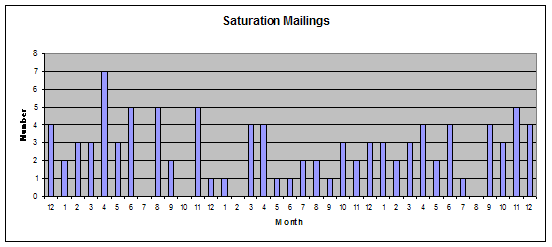Be Defensive
Whenever a company you do business with sends you a privacy notice, always respond to opt out of all information sharing.
Whenever you do business with any company where you give them your name and address, tell them that you do not want them to sell or give any of your personal information to anyone, and that you do not wish to receive any unsolicited calls, emails, or direct mail from them. This goes for any company. If you buy a house, be sure to tell the escrow and title companies, as well as the mortgage broker, the bank, and your real estate agent not to give our your information. These people are often sources for lists.
DO NOT return warranty cards. These will only get you on lists. In most cases they are just a waste of time.
DO NOT participate in sweepstakes.
DO NOT return surveys and questionnaires.
DO NOT give out your name and address if you don't have to. Oftentimes when I call up technical support for a company they ask for my name, address, and phone number. When asked, most of the time they will say it is not absolutely necessary.
DO NOT give out your social security number if you don't have to. Most of the time, you are not required to give anyone your SSN by law.
When you order something or give anyone your name, use a slight variation of your name or street address so that if you receive direct mail, you can tell who gave your name out. Try using a different middle initial for each company.
Get Off Lists
First: Sign up for the Direct Marketing Associations Mail Preference Service . DMA members in good standing are supposed to remove you from their mailings if you are on this list.
Second: Contact companies you do business with to tell them not to sell, share, or give your personal information to anyone. Examples of companies you should contact are:
| |
Type
|
Example |
| |
Banks |
Bank of America, Wells Fargo |
| |
Mortgage holders |
Washington Mutual, Fannie Mae |
| |
Insurance Companies |
Farmers, State Farm |
| |
Financial advisors |
JP Morgan, Fischer Investments |
| |
Brokers |
Charles Schwab, eTrade |
| |
Title Companies |
Fidelity National Title, American Title |
| |
Escrow companies |
|
| |
Credit card companies and issuers |
Citibank, First USA Bank |
| |
Utilities |
Southern California Gas
Southern California Edison
Marborg Waste Systems |
| |
Phone company |
Verizon |
| |
Wireless phone provider |
AT&T Wireless |
| |
Magazine publishers |
People, Business Week … |
| |
Grocery Stores |
Ralphs, Vons … especially if you used their discount card. |
| |
Internet Service Provider |
Earthlink, AOL |
Third: Contact companies that maintain and sell lists.
Here is a list of all companies I have contacted that maintain mailing lists. Here is a book marketing website's list of direct marketing companies.
Fourth: Look in your local phone book under Advertising-Direct Mail, and Mailing Lists to find local list resellers and direct mail houses. Send each one of these businesses a letter.
Respond to Direct Mail
No bad deed should go unpunished, but some punishment will fall on deaf ears. You can save time by following the approaches below.
Catalogs
Almost without exception, catalog retailers will tell you that it can take up to 90 days to stop receiving catalogs as they pre-print mailing labels. What is interesting is that I often receive a catalog a mere week after placing an order. I wonder how they do that given that they pre-print their mailing labels so far in advance. Hmmm.
Call the catalog company and request that you be taken off of their list and that they not sell or give your personal information to anyone. They will all tell you that you might still receive catalogs for up to 90 days (you often will) because of the way they prepare their lists and do their mailings. Record the date you talk to them and ignore catalogs for the next 90 days. If they continue to send you catalogs, contact them again.
Most companies I contacted about their catalogs were very reasonable and the catalogs eventually stopped coming. Some took 4-6 month before they stopped. A few were so unreasonable in their inability to stop sending me catalogs and the volume of catalogs they sent that they deserve a hall of shame mention here: TigerDirect.com (12 months and 12 catalogs) and Wine & All That Jazz (7 months and 6 catalogs).
If you look at the number of catalogs I received per month you can see that it took about a year to significantly reduce the number. The Christmas season typically brings new catalogs from companies I had never received one from before.

Coupons & ads
These are the supermarket coupons, coupon newspapers, and special ad packs that you receive in the mail along with the missing child address cards.
The three main companies that are responsible for these are ADVO and Val-Pak . ADVO in particular has been very helpful in getting off of their list. For the mailers that are not attributed to these two, you will have to track down the name and address or phone number of the sender and contact them. They are often buried deep inside the coupons.
All mail that is delivered to your mailbox is required to have an address on it. That is why mailers such as these come with an address card. If you receive these types of mailers without an address card, it means that that your postal carrier thinks he/she is doing you a service by delivering the mailers to you anyways. Permanently tape a note on the inside door of your mailbox asking the postal carrier to please not deliver supermarket flyers and coupon mailers if they don't have an address card. My notice also mentions all the ones I get by name.
Convenience checks
As a general rule, whenever I get convenience checks with my credit card statements I always contact the company to ask them to stop sending them to me. Like credit card offers, these are too dangerous to have sitting in an unlocked mailbox.
Credit card offers
As with any direct mail, contact the issuing company and ask them to never send you another offer and to take you off of their mailing list.
The three credit rating agencies, Experian, Equifax, and Trans-Union run a service that allows you to opt-out of any credit offers. Call 888-5-optout or go to www.optoutprescreen.com to sign up.
Complimentary magazines
Some of these magazines are geographically oriented and sent to most homes (for instance, Southern California Living and Los Angeles Magazine), and some come from companies you have done business with (for instance AAA).
If the magazine is mailed to you with your name on it, contact the sender to ask them to stop sending it to you. If your name does not appear on it, this is a saturation mailing. Don't waste your time trying to stop it.
Mailiers from companies you've done business with
Contact the company and ask them to stop sending you unsolicited mail and to not sell, share, or give your personal information to anyone.
Mailers from companies you haven't done business with
As a general rule, I sent a "please don't send me direct mail" postcard to anyone that sends me unsolicited mail. You may not want to because many companies do not sent repeat mailers. The problem is that most companies that send you direct mail hire direct mail companies to do the mass mailings for them. Unless you contact the company that does the mass mailing or owns the mailing list, an unlimited number of other companies can use that list in the future to send you direct mail. Contacting these companies has little or no effect.
On rare occasions I have gotten companies to tell me which mailing house they use. Usually, anyone you contact at a company that sent you direct mail won't have any idea about the advertising.
About half the mailers I get are from local companies. Because of this, one of the best ways to combat this type of mail is to contact all your local list resellers and direct mail houses. Look in your local phone book under Advertising-Direct Mail, and Mailing Lists to find local list resellers and direct mail houses. Send each one of these businesses a letter.
Mortgage refinance offers
Mortgage companies are one of the worst abusers of direct mail. A full 17% of the direct mail I receive is mortgage refinance offers, more than any other category.

My attempts to reduce mortgage refinance offers have been somewhat successful, but only because I have been so aggressive. Unfortunately, I don't think I have solved the problem, which is to get me off of the lists that mortgage companies use.
It is not exactly clear to me where mortgage companies get their lists. I have heard that they get them from public records, and I have heard from a mortgage broker and a real-estate agent that they get them from title companies. The title companies I have contacted say that they don't share personal information with anyone. They probably get lists from both sources. Eventually, most mortgage brokers will have contacted me and I will have asked them to stop sending me direct mail. At this point I seem to have gotten it down to one a month or so. I am still looking for the silver bullet on this one.
Political direct mail
Every election cycle I get flooded with yes on this, no on that, and vote for this candidate over that one. Unfortunately, there is no easy solution to political direct mail, at least in California. I suspect other states are similar.
California elections code sections 2184 and 2185 require that voter registration lists be made available to political candidates and organizations. The elections code only allows people to have their name stopped from being distributed by order of a superior court if they can show good cause that a life threatening circumstance exists, or if they are a participant in the Address Confidentiality for Victims of Domestic Violence and Stalking program. That excludes most of us.
The only way to be excluded from this list is to cancel your voter registration. To cancel your voter registration, contact your counties election office and request a cancellation form . Because you can register to vote up to 15 days before an election, I have found that registering right before an election and canceling your registration after an election may keep you from getting the mailings.
One note: do not provide your phone number on your voter registration. It isn't required and doing so will get you calls from political candidates and organizations.
Registering as an Independent seems to attract the highest volume of direct mail. Presumably, either party wants to try and sway you their way.
I found one particular company's political mail offensive so I created an anti-tribute site to them.
Saturation Mailings
Saturation mailings are hard to stop. Overall my efforts don't seem to have affected the quantity of these mailings.

But I have been a major pain in the ass to a few companies that have defiantly defended their right to send me this type of mail. I do get some satisfaction from that. This type of mail really needs a legal solution. It is likely that not filing a permanent change of address form with the Postal Service will significantly reduce the amount of this type of mail you get in the future.
Charitable organizations
Whenever you donate to a charitable organization, whether it is the United Way, the Sierra Club, or your local NPR station, be sure to tell them to not sell or give your personal information to anyone, and to not send you any direct mail, including request for more donations. My experience is that some charitable organizations, especially environmental ones, profusely distribute their lists to other organizations. Charitable organizations also seem not to have a very good handle on how to keep me off of their own mailing lists.
My recommendation: Donate to charitable organizations anonymously by sending a money order or cashiers check. This shouldn't affect the tax deductibility of a donation.
When They Won't Stop
In general, you get individual companies to stop sending you direct mail by telling them to stop sending it to you. Sometimes (oftentimes) companies will not comply.
The first time someone sends me direct mail I ask them to stop by sending them a postcard . Pre-made postcards make it easy to send out and cost less than letters (postcard rate vs. first class rate). The second time I send them a letter asking them to stop and remind them that I previously asked them. I always include specific dates that I previously contacted them to let them know I am serious. The third time I send them a nasty letter informing them of the law and threatening to file a Better Business Bureau complaint and a prohibitory order. The fourth time I file a better business complaint and aprohibitory order and send the company a letter letting them know that I have.
Better Business Bureau complaints have been a very effective tool. About 75% of the time they will get a company to respond quickly and do everything they can to remove my name from their mailing list. To file a BBB complaint, start here . However, the local BBB where I live has pretty much blacklisted me from filing any more of these type of complaints. J
Have a Little Fun - Get a Little Nasty
Send back Business Reply Envelopes with as much heavy things you can. While the Postal Service is required to deliver things put in the mail, they long ago started the practice of discarding Business Reply Envelopes if taped to a brick or other similar things, so don't bother trying that. A Straight Dope article describes this phenomenon, and the Postal Service also discusses this on their website.
Take all the Business Reply Mail inserts from magazines and drop them into the mail blank. Those things are just as annoying as direct mail.
|